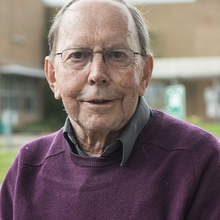In recognition of the 90th birthday of Professor Sir David Hopwood FRS, we take a look back at his career in microbiology and asked him his thoughts for the future
18 August 2023

Sir David is an Emeritus Fellow at the Department of Molecular Microbiology at the John Innes Centre in Norwich and an Emeritus Professor at the University of East Anglia. He has been a member of the Microbiology Society since 1955, was President of the Microbiology Society 2000–2003 and awarded honorary membership in 1990.
He is a pioneering microbiologist, geneticist and researcher into the biology of Streptomycetes, the bacteria that produce the majority of antibiotics in clinical use around the world today. From graduating with a degree in botany at Cambridge University, to a PhD in microbial genetics, to co-ordinating the sequencing of the genome of Streptomyces coelicolor, the largest microbial genome to be sequenced at the time, Sir David has had a momentous and fascinating career interacting with many great scientists and promoting the development of microbial genomics.
Find out more about Sir David Hopwood’s career in this interview and his short biography, and more about his research in Streptomycetes genetics in the series ‘Microbial Genomics: Standing on the Shoulders of Giants’, part I, part II and part III.
What piece of advice would you give to early career microbiologists starting out in the discipline today?
When I started my PhD in Cambridge in 1954, supervision was unbelievably lax by current standards. No detailed plan or milestones, no committee to satisfy with progress reports or even regular meetings with one’s supervisor. It was more or less: “Here are the actinomycetes, they could be evolutionarily intermediate between bacteria and fungi and so could be very interesting from a genetic point of view; see if you can find out.” There was no box to think outside of! Nowadays, at least in the field of natural products with which I am most familiar, there are so many techniques to master; genetic, chemical and biophysical, that there may be a danger of the PhD becoming more of an apprenticeship than a training in original thought. So, at least in the early stages of your PhD, while learning the tools of your trade, take the opportunity to think outside that box and mix the advantages of structured training in research with those of challenging discussions with colleagues and mentors.
Why do you think the Microbiology Society journals matter?
My first publication was in The Journal of General Microbiology, the precursor of Microbiology: the abstract of a paper given at a meeting of the Society in 1956. I went on to publish nearly 40 full-length papers there over the next 40 years, so a Society journal certainly mattered to me and to the development of the field of Streptomyces genetics! You can read my last paper published in Microbiology in 1999, reviewing the 40 years of research in Streptomyces genetics up to that point – so much has happened since!
There is now a bewildering choice of journals, and the development of Open Access (OA) publishing has opened moral as well as academic choices. Few wish the results of publicly funded research to bolster the profits of big commercial publishers, but the merits of publishing in the journals of learned societies like the Microbiology Society were misunderstood by the most zealous of the early advocates of OA, denying the enormous benefits that journal profits can bring to the work of societies such as ours: the laying on of the Annual Conference, the provision of grants to attend meetings, organise a conference, to promote science teaching or outreach, or to carry out an undergraduate research project and more. Publishing with the Society is a really good thing to do!
What excites you about the future of microbiology? What are your hopes?
The most exciting thing about any branch of science is the unexpected, and microbiology will keep revealing amazing examples of previously unexpected life forms living under mind-bogglingly challenging physical or chemical conditions or in ever more intricate relationships with other life forms, or making molecules of astonishing complexity. This is my hope, but I think it is a sure bet!
